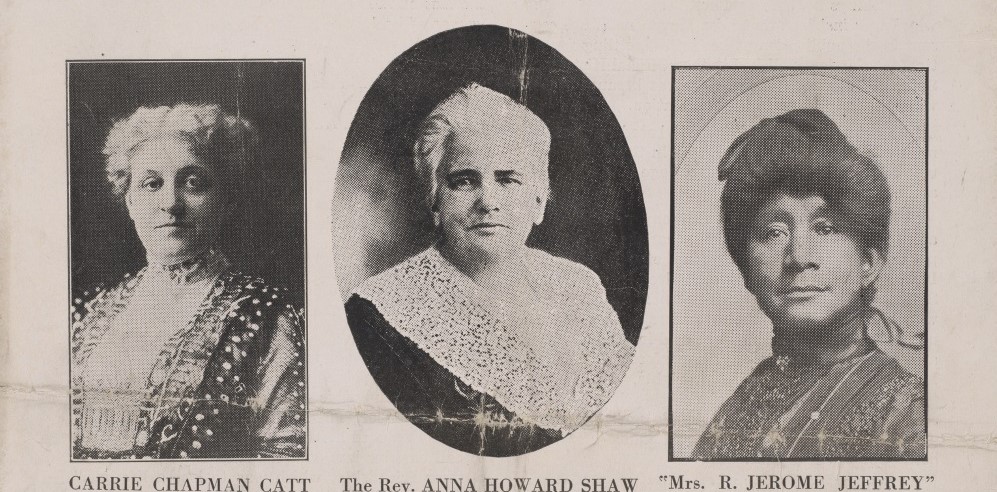In June 1919, Congress sent the proposed Nineteenth Amendment, guaranteeing women’s right to vote, to the states for ratification. By the end of the year, 22 of the necessary 36 states had ratified the amendment. Would the General Assembly of Virginia vote to ratify at its 1920 session? At a special session in August and September 1919, the assembly had refused to ratify the amendment, but in 1920 about half the members of the assembly were new. Moreover, the Equal Suffrage League of Virginia, the state’s largest suffrage organization, was working on strategy with sympathetic legislators. Accomack County senator G. Walter Mapp conferred with officers of the league, and Richmond suffragist Adèle Clark met on 2 December with Richard L. Brewer, who would be elected Speaker of the House of Delegates.
Officers and members of the Equal Suffrage League and Virginia members of the National Woman’s Party descended on the General Assembly when it convened on 14 January 1920. On 21 January, Carrie Chapman Catt, president of the National American Woman Suffrage Association, addressed the House of Delegates with some members of the Senate present. On that day, men and women opposed to woman suffrage made one last attempt to defeat ratification of the Nineteenth Amendment by suggesting that woman suffrage would lead to the destruction of white supremacy. Before the House session began, they placed a leaflet on the desk of every delegate that featured photographs of Catt, former NAWSA president Anna Howard Shaw, and “‘Mrs. R. Jerome Jeffrey’ (NEGRO),” and text that appeared to prove that the suffragists were apostles of racial equality and that Catt had enjoyed Jeffrey’s hospitality in her home.
The Richmond Evening Journal reported that afternoon that during Catt’s speech to the legislators she “denounced as a ‘malicious lie’ the report that she was ‘a guest in the home of a negro.’ This and other like reports, she said, were spread to prejudice southerners against the equal suffrage cause.” Catt predicted that voters in the future would be more intelligent “than the average man of today” and “prophesied an era when intelligence will be a prerequisite to qualifying for the ballot.” Perhaps Catt interjected that comment in the hope of reassuring men who opposed allowing white women and African Americans to vote that the existing difficult registration process would continue to restrict the vote to educated and respectable people. Catt concluded, “Men of Virginia, I entreat you to be just to the women.” The newspaper reported, “The speaker was frequently applauded.”
On 6 February 1920, the Senate rejected the Nineteenth Amendment by a vote of 24 to 10, and on 12 February, the House of Delegates rejected it 62 to 22. However, during debate in the Senate, several senators who opposed ratification of the Nineteenth Amendment “stated that they would favor submission of an amendment to the State Constitution granting suffrage to women, but that they were unalterably opposed to any amendment to the Federal Constitution which violated the principles of States’ rights.” By which they meant the right of states to maintain almost impossibly high barriers to African American voting.
If the General Assembly had voted to submit an amendment to the state constitution for voters to ratify or reject, the Equal Suffrage League would have achieved its original objective. But what if enough other states ratified the Nineteenth Amendment to put it in the Constitution before the 1920 general election? How could Virginia women then vote? In March 1920, in two separate actions, the General Assembly took action on both questions, which will be addressed in a future blog post.
We Demand is on view at the Library of Virginia through 5 December 2020, Monday through Saturday from 9:00 A.M. to 5:00 P.M. The Library’s accompanying book, The Campaign for Woman Suffrage, will be available for purchase at The Virginia Shop in March 2020.
A traveling exhibition will be on view at local libraries and historical societies around the state beginning in March 2020. See the schedule here.
This exhibition is a project of the Task Force to Commemorate the Centennial Anniversary of Women’s Right to Vote.
-Brent Tarter, co-curator of the We Demand exhibit











2 Comments